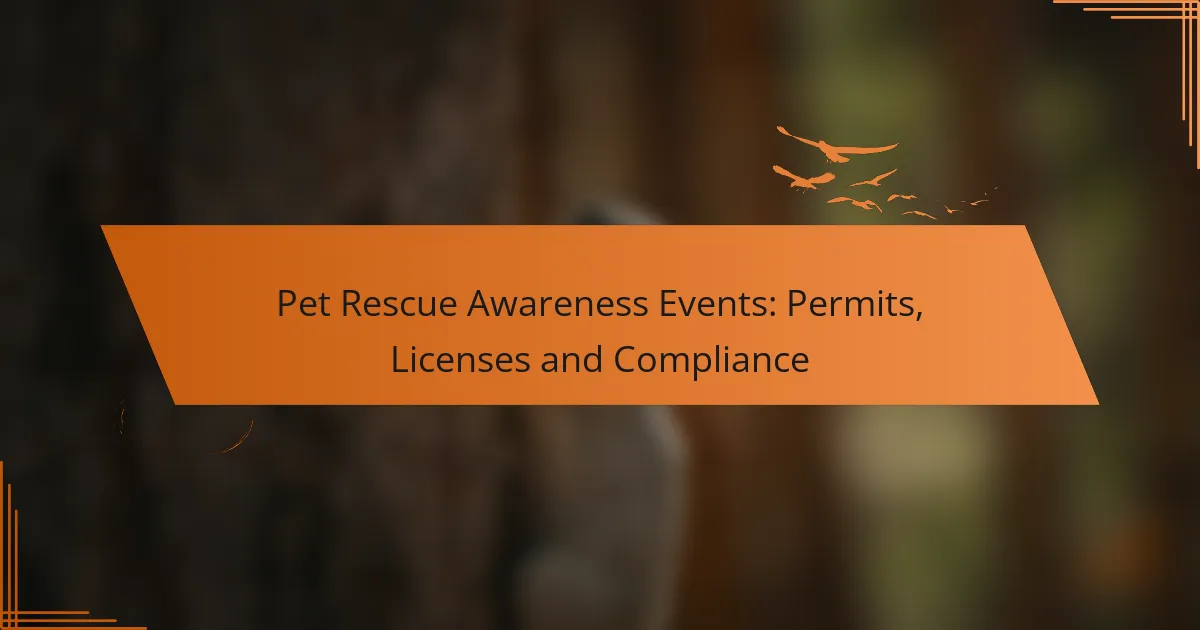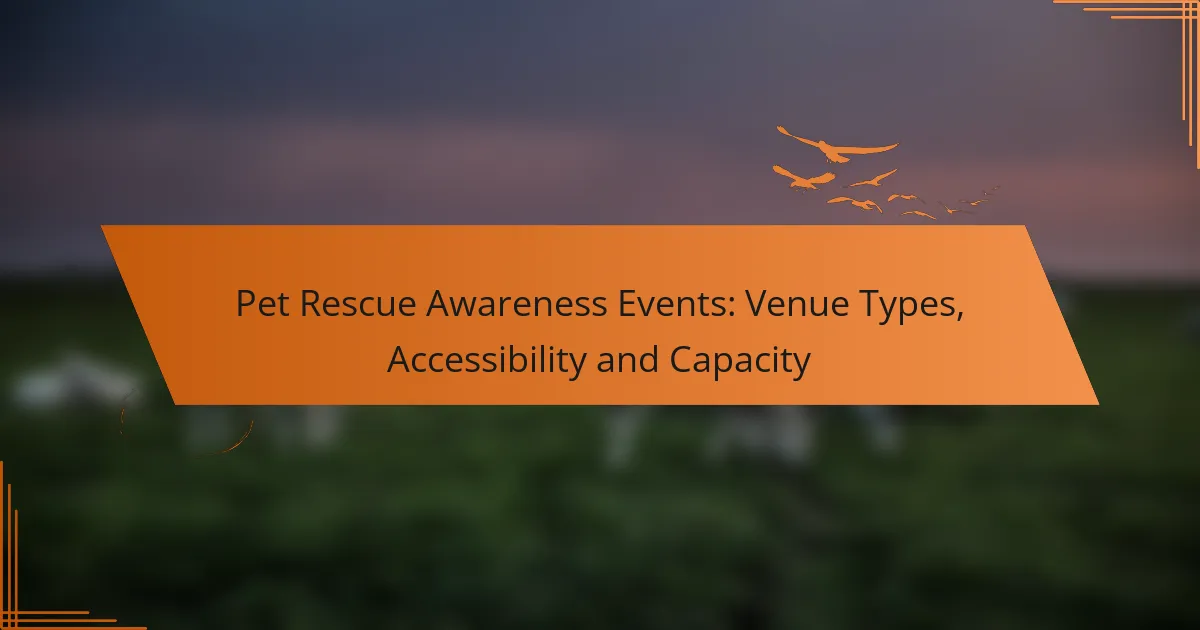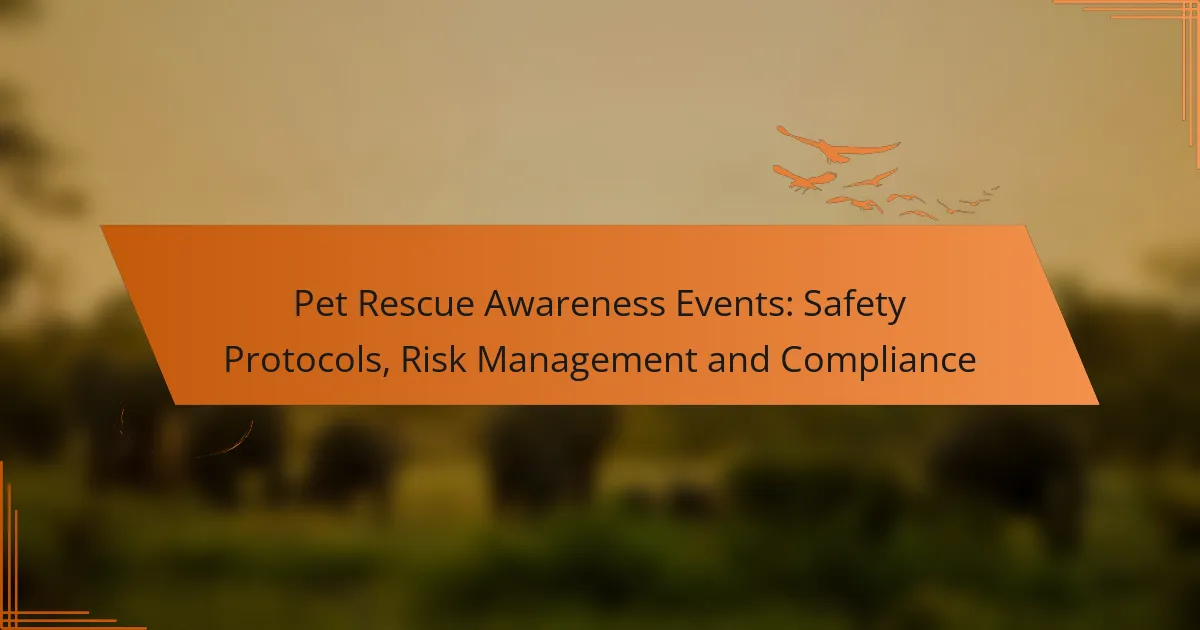Pet rescue awareness events play a crucial role in promoting animal welfare, but they often require various permits and licenses to ensure compliance with local, state, and federal regulations. Obtaining these permits involves following specific procedures set by local authorities, including submitting applications and paying associated fees. Additionally, pet rescue organizations must secure the necessary licenses to operate legally, which can vary significantly depending on the location.
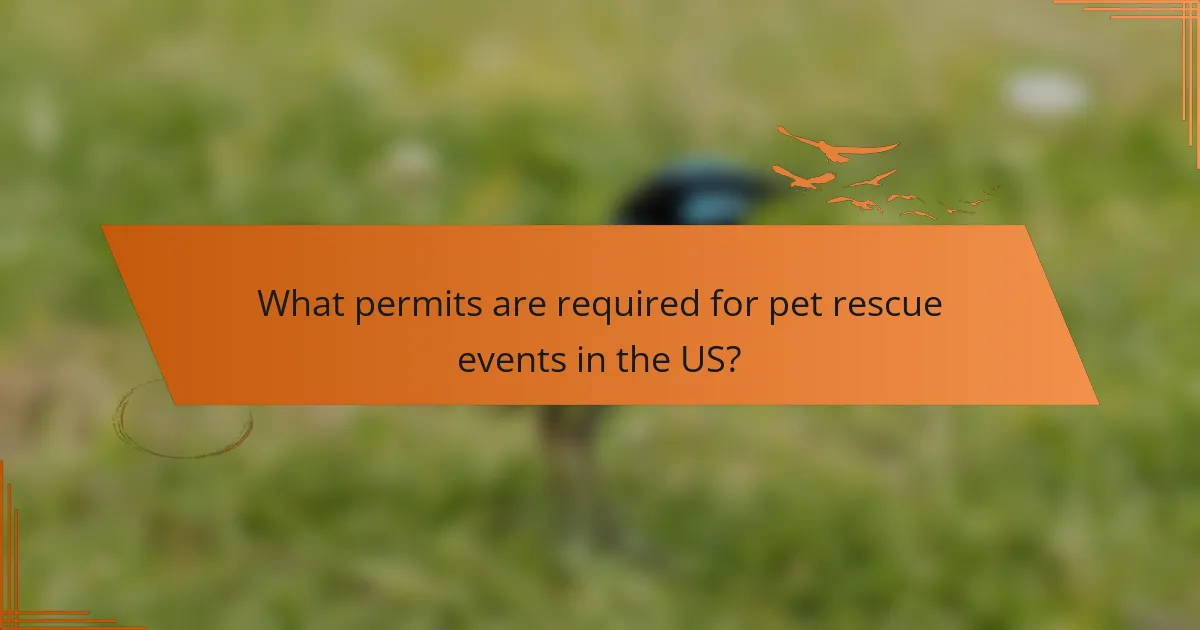
What permits are required for pet rescue events in the US?
Pet rescue events in the US typically require various permits to ensure compliance with local, state, and federal regulations. These permits help safeguard animal welfare and public safety while facilitating successful events.
Local event permits
Local event permits are often necessary for hosting pet rescue events in specific municipalities. These permits may cover aspects such as location usage, noise ordinances, and public safety measures. It’s essential to check with local authorities to understand the specific requirements and application processes.
Some cities may have additional regulations, such as limits on the number of animals present or requirements for veterinary oversight. Always confirm with local officials to avoid potential fines or event cancellations.
State animal rescue licenses
Many states require animal rescue organizations to obtain a state animal rescue license to operate legally. This license ensures that the organization meets specific standards for animal care and welfare. The application process may involve background checks, facility inspections, and proof of financial stability.
Licensing requirements can vary significantly by state, so it’s crucial to research the regulations in your area. Some states may also require periodic renewals and continuing education for staff involved in animal care.
Federal compliance regulations
At the federal level, compliance with regulations from the Animal and Plant Health Inspection Service (APHIS) is essential for pet rescue events that involve interstate transport of animals. Organizations must adhere to the Animal Welfare Act, which sets standards for the treatment and care of animals during transport and at events.
Additionally, if the event includes fundraising activities, compliance with federal tax regulations may be necessary. Ensure that your organization is registered as a nonprofit and understands the tax implications of any funds raised during the event.

How to apply for pet rescue event permits?
To apply for pet rescue event permits, you must follow specific procedures set by local authorities. This typically involves submitting an application form along with required documentation and paying any associated fees.
Application process overview
The application process for pet rescue event permits usually begins with filling out a designated form provided by your local government or animal control agency. Ensure you check the specific requirements for your area, as these can vary significantly.
After submitting your application, it may take several weeks for processing. During this time, authorities may conduct background checks or site inspections to ensure compliance with local regulations.
Required documentation
Documentation typically required for a pet rescue event permit includes proof of liability insurance, a detailed event plan, and any necessary health certificates for the animals involved. Some jurisdictions may also require a letter of support from a recognized animal welfare organization.
Be prepared to provide identification and any permits related to the location where the event will take place. Having all documents organized can expedite the approval process.
Fees and timelines
Fees for pet rescue event permits can range from modest amounts to several hundred dollars, depending on the size and scope of the event. It’s advisable to check with your local authority for specific fee structures.
Timelines for permit approval can vary, but expect a processing time of two to six weeks. Plan your application submission well in advance of your event to avoid any last-minute issues.
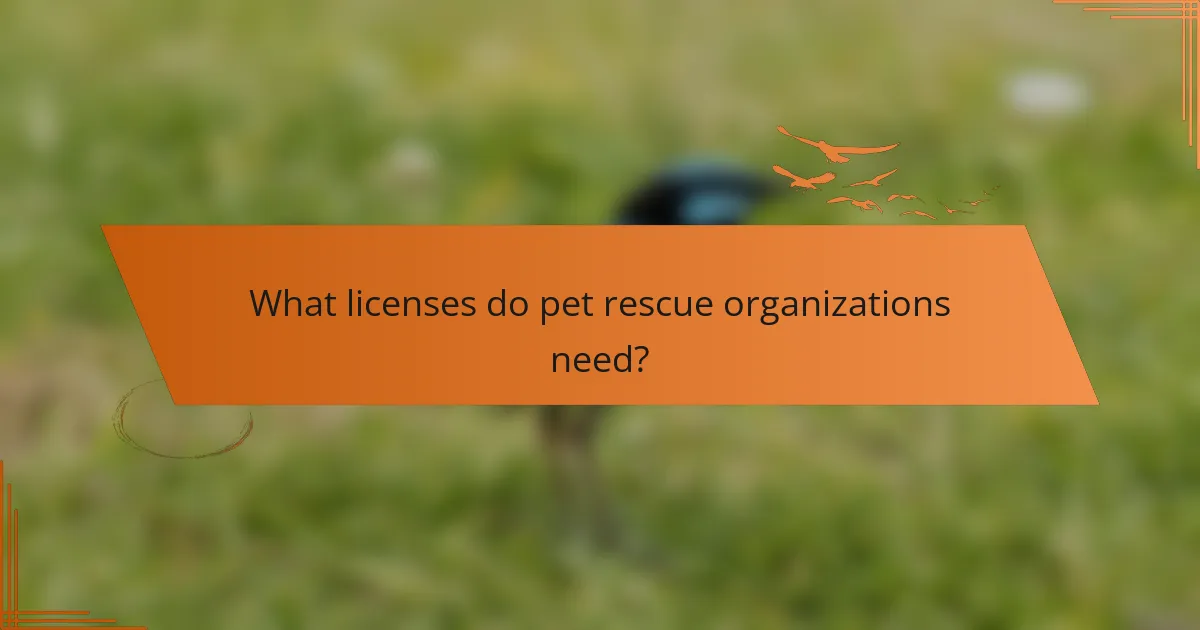
What licenses do pet rescue organizations need?
Pet rescue organizations typically require several licenses and permits to operate legally and effectively. These can include non-profit status, animal shelter licenses, and fundraising permits, each with specific requirements and regulations that vary by location.
Non-profit status requirements
To operate as a pet rescue organization, obtaining non-profit status is essential. This designation allows organizations to receive tax-exempt status and eligibility for grants and donations. Requirements often include filing articles of incorporation, creating bylaws, and applying for 501(c)(3) status with the IRS in the United States.
Organizations should also keep in mind that maintaining non-profit status requires adherence to specific operational standards, including regular reporting and transparency in financial practices. It’s advisable to consult with a legal expert to ensure compliance with local laws.
Animal shelter licenses
Most states and municipalities require pet rescue organizations to obtain an animal shelter license to operate legally. This license ensures that the organization meets health and safety standards for the animals in their care. The application process may involve inspections and proof of adequate facilities.
Licensing requirements can vary significantly; for example, some areas may require background checks for staff and volunteers, while others may have specific space and care standards. Organizations should check with local animal control or regulatory agencies for precise requirements.
Fundraising permits
If a pet rescue organization plans to conduct fundraising activities, it may need to obtain specific permits. These permits ensure that fundraising efforts comply with local regulations and protect donors. Common activities requiring permits include charity events, raffles, and online crowdfunding campaigns.
Organizations should research the regulations in their state or municipality, as some areas have strict guidelines on how funds can be raised and reported. It’s crucial to keep accurate records of all fundraising activities to maintain compliance and transparency.
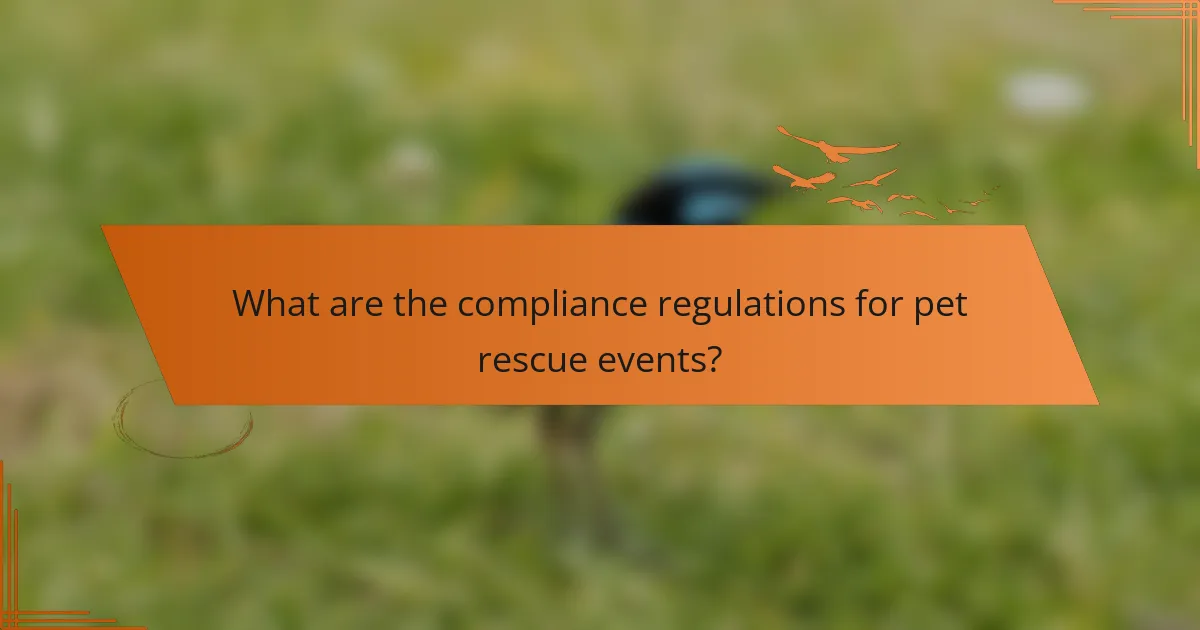
What are the compliance regulations for pet rescue events?
Compliance regulations for pet rescue events encompass various health, safety, and legal requirements that organizers must adhere to. These regulations ensure the well-being of animals and participants, and they can vary significantly based on location.
Health and safety standards
Health and safety standards for pet rescue events include guidelines for sanitation, crowd control, and emergency procedures. Organizers should ensure that the venue is clean and that there are adequate facilities for both animals and attendees, such as rest areas and first aid stations.
It is essential to have protocols in place for handling emergencies, including access to veterinary care and clear evacuation routes. Regular inspections of the event site can help identify potential hazards and mitigate risks.
Animal welfare laws
Animal welfare laws govern the treatment and care of animals during rescue events. These laws may require permits for the transportation and display of animals, as well as specific conditions for their housing and care. Compliance with local animal control regulations is crucial.
Organizers should familiarize themselves with state and local laws regarding animal adoption, health checks, and vaccination requirements. Failure to comply can result in fines or the cancellation of the event.
Insurance requirements
Insurance is a critical component of compliance for pet rescue events. Organizers typically need liability insurance to protect against potential claims arising from accidents or injuries during the event. This coverage can safeguard both the event organizers and the venue owners.
It’s advisable to consult with an insurance professional to determine the appropriate coverage levels based on the size and scope of the event. Additionally, some venues may require proof of insurance before granting permission to hold the event.
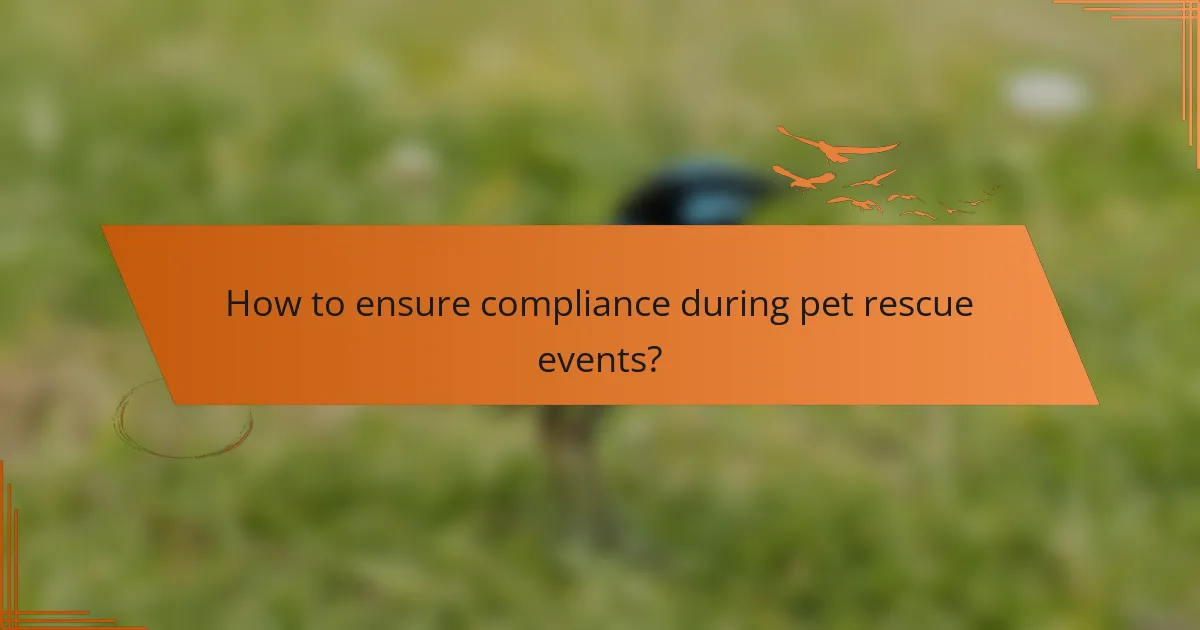
How to ensure compliance during pet rescue events?
To ensure compliance during pet rescue events, organizers must adhere to local regulations, obtain necessary permits, and follow best practices for animal welfare. This involves understanding the legal requirements and implementing effective procedures to safeguard both animals and participants.
Staff training and guidelines
Proper staff training is essential for compliance at pet rescue events. All team members should be familiar with local laws regarding animal handling, safety protocols, and emergency procedures. Regular training sessions can help reinforce these guidelines and ensure everyone is prepared to act responsibly.
Establish clear guidelines for staff roles and responsibilities. For example, designate specific individuals to handle animal care, manage crowd control, and oversee compliance checks. This division of labor can help streamline operations and reduce the risk of oversight.
Monitoring and reporting procedures
Implementing monitoring and reporting procedures is crucial for maintaining compliance during pet rescue events. Designate personnel to oversee operations and ensure adherence to regulations throughout the event. This can include regular checks on animal conditions and participant safety.
Establish a reporting system for any incidents or concerns that arise. This could involve a simple logbook or digital reporting tool where staff can document issues and resolutions. Prompt reporting helps address problems quickly and improves overall event management.
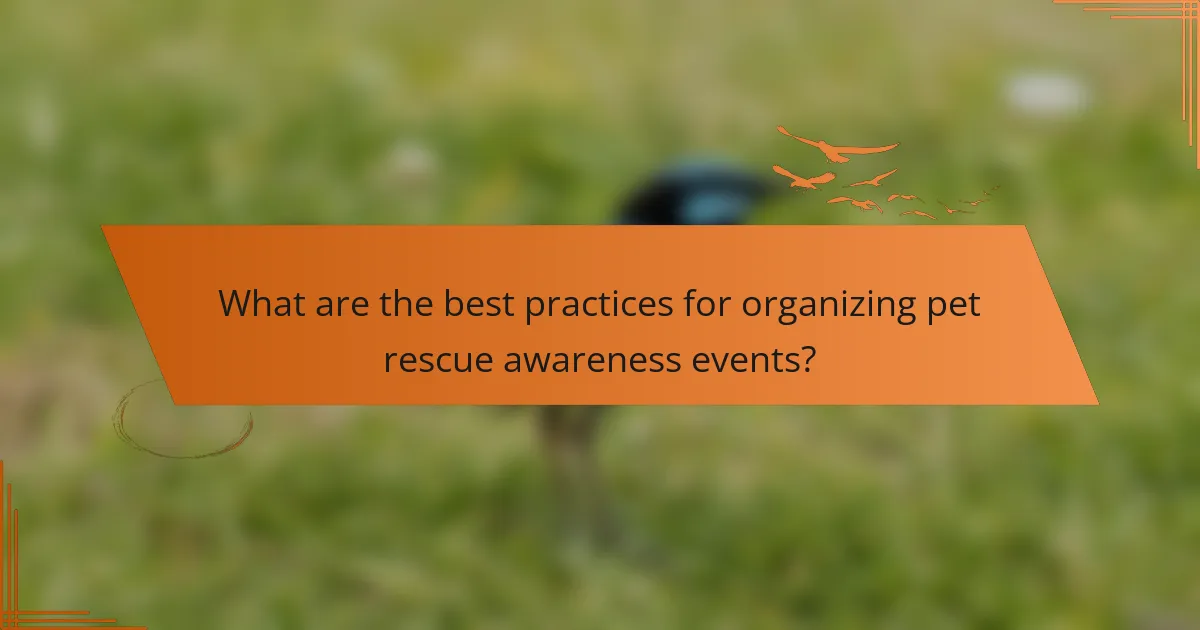
What are the best practices for organizing pet rescue awareness events?
To effectively organize pet rescue awareness events, focus on clear objectives, community involvement, and compliance with local regulations. Engaging the community and ensuring proper permits and licenses are crucial for a successful event.
Community engagement strategies
Engaging the community is vital for the success of pet rescue awareness events. Start by identifying local pet owners, animal lovers, and community groups who share a passion for animal welfare. Utilize social media platforms to spread the word and create buzz around the event.
Consider hosting pre-event activities, such as workshops or informational sessions, to build interest and gather support. Collaborate with local businesses, shelters, and veterinary clinics to enhance outreach and provide resources for attendees. Offering incentives, like discounts or giveaways, can further encourage participation.
Lastly, ensure that your event is accessible and inclusive. Consider various demographics in your community, and provide materials in multiple languages if necessary. Creating a welcoming atmosphere will foster a sense of belonging and encourage more people to engage with your cause.
